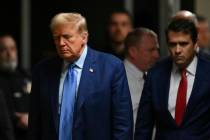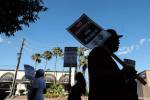Supreme Court rules against public-sector union fees
WASHINGTON — The Supreme Court ruled Wednesday that government workers can’t be forced to contribute to labor unions that represent them in collective bargaining, dealing a serious financial blow to organized labor.
The justices are scrapping a 41-year-old decision that had allowed states to require that public employees pay some fees to unions that represent them, even if the workers choose not to join.
The 5-4 decision in Janus vs. American Federation of State, County and Municipal Employees, Council 31 fulfills a wish of conservatives to get rid of the fair-share fees that nonmembers pay to unions in roughly two dozen states.
The court ruled that the laws violate the First Amendment by compelling workers to support unions they might disagree with.
“States and public-sector unions may no longer extract agency fees from nonconsenting employees,” Justice Samuel Alito said in his majority opinion for the court’s five conservative justices.
President Donald Trump weighed in minutes after the decision was handed down, while Alito still was reading a summary of his OVERSET FOLLOWS:majority opinion from the bench.
“Big loss for the coffers of the Democrats!” Trump said in a tweet.
In dissent, Justice Elena Kagan wrote of the big impact of the decision. “There is no sugarcoating today’s opinion. The majority overthrows a decision entrenched in this Nation’s law — and its economic life — for over 40 years. As a result, it prevents the American people, acting through their state and local officials, from making important choices about workplace governance. And it does so by weaponizing the First Amendment, in a way that unleashes judges, now and in the future, to intervene in economic and regulatory policy.”
The court’s three other liberal justices joined the dissent.
Nevada impact
Nevada is among more than 20 states that already have similar laws in place, and thus Wednesday’s decision will not directly affect state employees and unions.
But the ruling will sap resources from national labor organizations that represent workers in Nevada, said Ruben Garcia, a labor law professor at UNLV.
‘’The national unions will be weakened at the bargaining table, and the engagement of those unions will also decline,’’ Garcia said.
The decision could affect unions’ ability to fight on key issues such as increases in federal protections for minimum wage and overtime pay, the professor said.
John Vellardita, executive director of Clark County Education Association, which represents 11,000 licensed professionals in the state, said the decision has more to do with political power in the country than labor law.
”The unions have been a lifeline to the Democratic Party, and they are going to have less funds,” he said, adding that Wednesday’s decision did not come as a surprise.
“This is a wake-up call for organized labor that we have to change the way we do business. We need to show that we are good for society and encourage more people to become members,” Vellardita said.
Roughly 164,000 Nevada workers are members of unions, according to the Bureau of Labor Statistics, including about 57,000 in the private-sector Culinary union.
But 189,000 Nevada residents, or nearly 15 percent of the working population, are covered by union contracts, according to the bureau.
SEIU Nevada Local 1107, which represents 19,000 employees in health care and the public sector, called on workers to stick together and hit the polls this election year.
”Members are mobilizing in 2018 to ensure that elected leaders are held accountable to creating good, union jobs and putting working Nevadans first,” Local 1107 Deputy Trustees Grace Vergara-Mactal and Brian Shepherd said in a statement.
The Culinary union, which said more than 90 percent of workers voluntarily pay fees, also ripped Wednesday’s decision.
“The targeted attacks on workers by right-wing billionaires who bankrolled #JanusvAFSCME and rig the system is shameful,” the union said in a tweet.
Contact Todd Prince at 702-383-0386 or tprince@reviewjournal.com. Follow @toddprincetv on Twitter. The Associated Press contributed to this report.




























